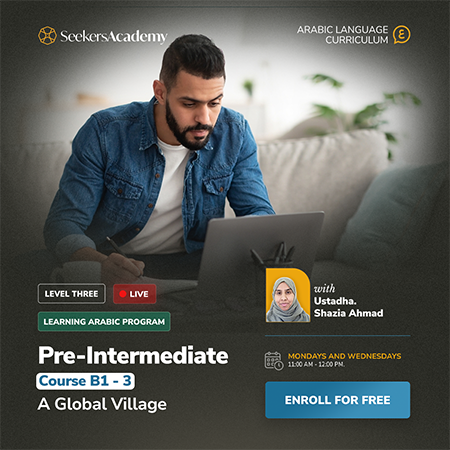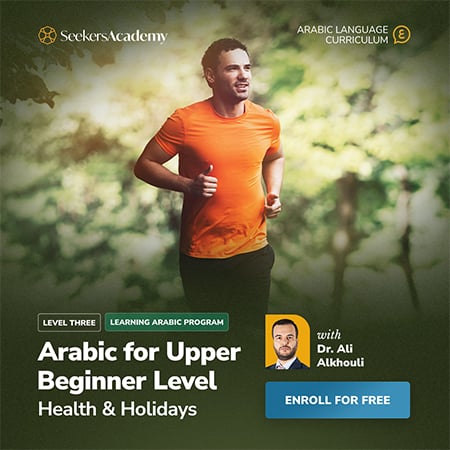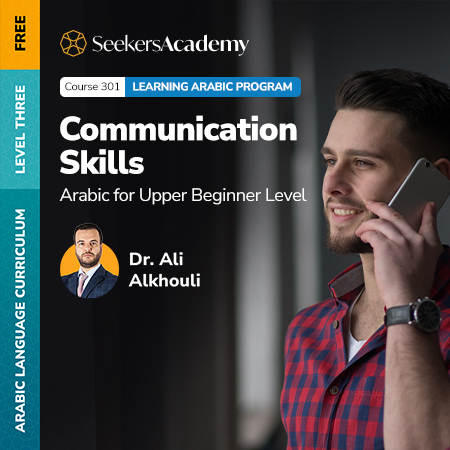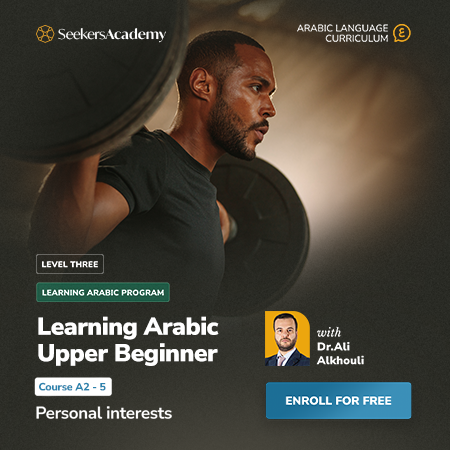
This is the 13th course in our Online Learning Arabic program, where we teach about the world being a global village and the importance of cleanliness and hygiene. This course covers chapters 9 & 10 of the second volume of our textbook.
- Teacher: Ustadha Shazia Ahmad
Al-Arabiyya Bayna Yadayka (العربية بين يديك) is a famous textbook used worldwide for teaching Modern Standard Arabic to non-native speakers. It focuses on teaching culture, grammar and basic conversation, as well as parts of Islam. Accompanied by sound files, it provides ample practice for each of the four skills of listening, reading, writing and speaking We are using the first of the eight volumes. This textbook is ideal for this curriculum because it contains the necessary teachings for language fluency while being broken down into easy, manageable steps.
This course is intended for non-native speakers of Arabic aged 14 years and over, who have completed the first 12 Arabic courses and are interested in continuing to pick up Arabic speaking skills and increasing their understanding of the Holy Quran.
- Build on their Arabic vocabulary.
- Discuss the reasons that the world has become a global village
- Speak about modes of transportation and modern methods of communication
- Learn about the aspects of hygiene and cleanliness in Islam
- Learn many new grammar points, including declinable and non-declinable words, dual nouns and relative pronouns.

This eighth step in our Online Arabic learning program focuses on specific topics of everyday life. This 302 course is to be taken after completing (101, 102, 103, 201,202, 203 and 301). The 300 series is the Upper course within the beginner level.
This course covers essential vocabulary, expressions, and parts of Arabic culture that provide the means to converse with native speakers. The student will emerge from this class better acquainted with practical knowledge of Modern Standard Arabic using the four skills of reading, writing, listening and speaking.
The chapters covered in this course are health and holiday. The student will learn the vocabulary and dialogue of these topics, as well as apply the practice of writing, reading and listening to a specific letter with each lesson. Sentences and questions will be presented to facilitate memorization and fluency of speech.
you must learn the vocabulary, questions, and expressions contained in these lessons because they are essential to talk about health and holidays. Focusing on letters is important to enhance their use and recognition, and this helps distinguish between similar letters and sounds.
- Teacher: Dr.Ali Al Khouli
Al-Arabiyya Bayna Yadayka (العربية بين يديك) is a famous textbook used all over the world for teaching Modern Standard Arabic to non-native speakers. It focuses on teaching culture, grammar and basic conversation, as well as touching on religion. Accompanied with sound files, it provides ample practice for each of the four skills of listening, reading, writing and speaking We are using the second of the eight volumes. This textbook is ideal for this curriculum because it contains the necessary parts for language fluency while being broken down into easy, manageable steps.
- This course is for non-native speakers, approximately ages 14 and above.
- It is particularly beneficial for any students wanting to learn how to pick up Arabic speaking skills rapidly
- In order to successfully complete this course, students should finish course 301
- This course can also be taken by anyone who is interested in grammar, improving their understanding of the Quran or solidifying their basic foundation of Arabic.
- Pertaining of new terminology to the topics of the lesson.
- Linking some public morals to the topics of the lesson.
- Practicing the four language skills to the topics of the lesson

This seventh course in the Learning Arabic track covers the topics of travel, Hajj and ‘Umra. The student will learn the essential vocabulary, expressions, and cultural aspects necessary to communicate effectively with native Arabic speakers.
Upon completion of this class, the student will gain a better understanding of Modern Standard Arabic through reading, writing, listening, and speaking.The learning material and teaching method is structured in a way to facilitate memorization and fluency of speech. Emphasis on specific letters – recognition of, their use and distinction between similar letters and sounds continues in this course.
It is strongly recommended for every Muslim who intends to travel/perform the Hajj and ‘Umra, to learn the essential vocabulary, questions, and expressions contained in this course.
This 301 course is to be taken after completing (101, 102, 103, 201, 202, 203). The 300 series courses are classified as Upper Beginner level courses within the beginner level.
- Teacher: Dr.Ali Al Khouli
Al-Arabiyya Bayna Yadayka (العربية بين يديك) is a famous textbook used all over the world for teaching Modern Standard Arabic to non-native speakers. It focuses on teaching culture, grammar and basic conversation, as well as touching on religion. Accompanied by sound files, it provides ample practice for each of the four skills of listening, reading, writing and speaking We are using the first of the eight volumes. This textbook is ideal for this curriculum because it contains the necessary tools for language fluency while being broken down into easy, manageable steps.
- This course is for non-native speakers, approximately ages 14 and above.
- Particularly beneficial for any students wanting to build on Arabic speaking skills rapidly.
- For students who have completed Arabic 203.
- Students interested in grammar, improving their understanding of the Quran and/or solidifying their basic foundations of Arabic.
- Acquire new vocabulary, expressions and questions in relation to the topics of the course.
- Cultural aspects in relation to the topics of the course.
- Practicing the four core language acquisition skills in relation to the topics of the course.

This course in our Online Arabic learning program focuses on specific topics of everyday life (Interest in health and entertainment). This course is to be taken after completing the Second course at the Upper Intermediate level within the beginner level.
This course covers essential vocabulary, expressions, and parts of Arabic culture that provide the means to converse with native speakers. The student will emerge from this class better acquainted with practical knowledge of Standard Arabic using the four skills of reading, writing, listening and speaking.
The chapters covered in this course are Interest in health and entertainment. The student will learn the vocabulary and dialogue of these topics, as well as apply the practice of writing, reading and listening to a specific letter with each lesson. Sentences and questions will be presented to facilitate memorization and fluency of speech.
You must learn the vocabulary, questions, and expressions contained in these lessons because they are essential to talk about Interest in health and entertainment. Focusing on letters is important to enhance their use and recognition, and this helps distinguish between similar letters and sounds.
- Teacher: Dr.Ali Al Khouli
Al-Arabiyya Bayna Yadayka (العربية بين يديك) is a famous textbook used all over the world for teaching Modern Standard Arabic to non-native speakers. It focuses on teaching culture, grammar and basic conversation, as well as touching on religion. Accompanied with sound files, it provides ample practice for each of the four skills of listening, reading, writing and speaking We are using the second of the eight volumes. This textbook is ideal for this curriculum because it contains the necessary parts for language fluency while being broken down into easy, manageable steps.
This course is for non-native speakers, approximately ages 14 and above
It is particularly beneficial for any students wanting to learn how to pick up Arabic speaking skills rapidly
In order to successfully complete this course, students should finish second course at the Upper Intermediate level
This course can also be taken by anyone who is interested in grammar, improving their understanding of the Quran or solidifying their basic foundation of Arabic.
Ability to use new vocabulary and terminology related to personal interests in different– contexts.
- The ability to simulate the Arab culture with regard to personal interests in terms of cultural expressions and situations.
Developing the four language skills in expressing personal interests.
- Studying the grammatical rules and structures necessary to formulate appropriate sentences in the oral and written expression of personal interests.